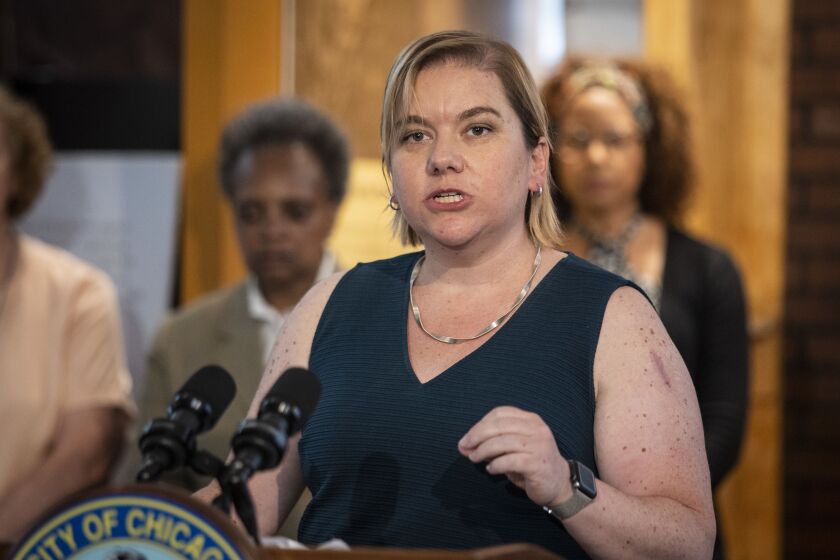One month before the stay-at-home shutdown triggered by the coronavirus pandemic, Mayor Lori Lightfoot boldly declared that “poverty is killing us” and vowed to end it in Chicago “in the next generation.”
On Thursday, the first African American female and first openly gay mayor of Chicago made an equally bold political statement. She declared systemic racism a public health crisis.
Lightfoot said she can do nothing less after a pandemic that forced black and Hispanic Chicagoans to bear the brunt of the layoffs and deaths. It exposed Chicago’s ugly underbelly — higher crime rates in neighborhoods of color triggered, in large part by disparate access to health care, healthy food options, jobs and economic opportunity.
Lightfoot noted that “80% of health outcomes are due to social factors, including housing, safety, education, economic opportunity — every single one of which have, through our history as a nation, been impacted by systemic racism. ... That’s why we’re making this declaration today. Because we can no longer allow racism to rob our residents of the opportunity to live and lead full, healthy and happy lives.”
The mayor said she need look no further than her own parents to see how the “insidious nature” of systemic racism impacts the body and the mind in ways that are “just as, if not more, deadly.”
It “puts a cap on someone’s humanity,” destroys their “perception of themselves” and leaves them with “lasting mental illness, such as depression, anxiety and anger that turns into physical ailments.”
Both her parents were born in the 1920’s and raised in the segregated South. Their dreams were crushed because every aspect of their growing up, every aspect of their community and their humanity was “defined by trying to stay out of harm’s way, simply because they were Black,” Lightfoot said.
“My mother wanted to be a nurse. My father wanted to be lawyer. But because they were Black and Black success was considered [not just] an anomaly, but worse, a threat, and became a target for retaliation, my parents, like so many others of their generation and other generations, were indoctrinated to believe that they would never, ever be able to reach for and accomplish their dreams,” she said.
“This was and still is the case for far too many Black residents and residents of color in our city. And ladies and gentlemen, it is literally killing us.”
Chicago is not the first major city to declare systemic racism a public health crisis. That distinction belongs to Milwaukee County in Wisconsin, where the trail was blazed two years ago.
Boston, Denver and Columbus, Ohio have followed suit.
The American Public Health Association also has declared racism a public health crisis needing immediate attention. So have the Centers for Disease Control and Prevention, the American Medical Association, the American Association of Pediatrics, and the American College of Emergency Physicians.
Lightfoot said it’s only fitting for Chicago, a city with a long and documented history of segregation and disinvestment that continues to this day, to join the parade.
She made the announcement in North Lawndale, near the site where Dr. Martin Luther King Jr. had lived when he and his family moved to Chicago in 1966 to highlight the city’s notoriously segregated housing practices.
Beyond the symbolic value of Thursday’s declaration was something more concrete.
Chicago Health Commissioner Dr. Allison Arwady announced that $9.6 million in COVID-19 relief funding from the CDC would be dispersed to six “Healthy Chicago Equity Zones.”
Each zone will have its own lead organization, charged with “dismantling historical inequities” that have plagued Chicago neighborhoods.
They are: Phalanx Family Services (Far South Region); Greater Auburban Gresham Development Corporation (Near South); Swedish Covenant Hospital (North/Central); Northwest Side Housing Center (Northwest); Southwest Organizing Project (Southwest) and Rush University Medical Center on behalf of West Side United (West Region.)
Many of the designated organizations were part of the “Racial Equity Response Teams” created during the pandemic.
“Throughout [the pandemic], we have been led by data. We have targeted resources to the people and communities where they most needed. but we have also seen that, when one community is not well, the city is not well and cannot move ahead,” Arwady said.
“Now, we have to bring that same unrelenting focus to another more pernicious public health threat: racism.”








